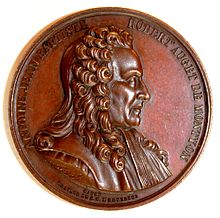1823 Kindness is rewarded
This site often marks the great, the horrible, and the momentous, but today we pause to consider the actions of six kind people, five of them poor, and undistinguished except by virtue, and the rich man who posthumously recompensed them.
On the 25th of August 1823, took place one of those distributions of the Montyon prizes which form so pleasant a feature in the social condition of France. The Baron de Montyon, or Monthyon, was a wealthy man, who, during the second half of the last century, occupied a distinguished place in the estimation of his countrymen; chiefly in various judicial capacities, in which his probity and honour were universally admitted. He established, at various periods of his life, no less than eight prizes, to be awarded to worthy recipients by the Académie des Sciences, the Académie Française, and the Faculté de Medicine. They were briefly as follows: In 1780, he invested 12,000 francs, the interest to be spent as an annual prize for inventions and discoveries useful in the arts. In 1782, he invested an equal sum, for an annual prize for any literary work likely to be most useful to society; and a similar one for lessening the unhealthiness of trades and manufactures. In 1783, another of equal amount for the benefit of the poor of Poitou and Berri; one for assisting poor men of letters; one for simplifying certain special mechanical arts; and one for rewarding acts of virtue among the poor. In 1787, and subsequent years, he established other prizes—all for good and worthy objects. The revolution drove him to Switzerland, and then to England, whence he did not return to France till 1815. His prize for virtue had been suppressed by the revolutionists; but he took care, by his will, to remodel it on a permanent and enlarged basis. This good man died in 1820, at the advanced age of eighty-seven.
The distribution in 1823 will serve as well as any other, to show the mode in which the Montyon prize for virtue is awarded. Five prizes were given to five persons—four women and one man. One of the women, although her husband earned but sixteenpence a day, had taken into her house and supported a poor destitute female neighbour. Another, a milliner, had for twelve years supported the mistress under whom she had served as an apprentice, and who was afflicted with an incurable malady. A third had, in a similar way, supported for seventeen years a mistress under whom she had acted as a servant, and who had fallen into abject poverty. A fourth, who was a portress, had shewn her charity in a somewhat similar way. These four persons received one thousand francs each. But the chief prize was awarded to an old clothesman, Joseph Bécard.
During the French Revolution, one M. Chaviffiac, of Arras, had first been imprisoned, and then put to death. Many years afterwards, in 1812, his widow came to Paris, to obtain, if possible, some property which had belonged to her husband. In this she failed, and she was reduced to the lowest pitch of want. Bécard, when a servant to the Marquis de Steinfort, at Arras, had known the Chavilliacs as persons of some consideration in the place; and happening now to meet the poor lady in her adversity, he resolved to struggle for her as well as for himself, for grief had made her blind and helpless. He begged coarse food for himself, in order that he might buy better food for her out of his small incomings as an old clothesman. She became ill, and occupied the only bed he possessed; and he slept on a chair for three months—or rather kept resolutely awake during the greater part of the night, in order that he might attend upon the sick lady. Pain and suffering made her peevish and sour of temper; but he bore it all patiently, never once departing from his custom of treating her as a lady—higher in birth and natural condition than himself. This life continued for eleven years, she being the whole of the time entirely dependent on that noble-spirited but humble man. The lady died in May 1823. Bécard gave a small sum to a curé, to offer up prayers for her soul; he carved with his own hands a small wooden cross; and he placed it, together with an inscription, on her grave. Such was the man to whom the Académie Française, acting under the provisions of the Montyon bequest, awarded a prize of fifteen hundred francs, a gold medal, and honourable commendation in presence of the assembled academicians.
These prizes, often considered the forerunners of the Nobel Prizes, continue to be offered. One of them was awarded in 1879 to the French-Canadian writer Louis Fréchette.
